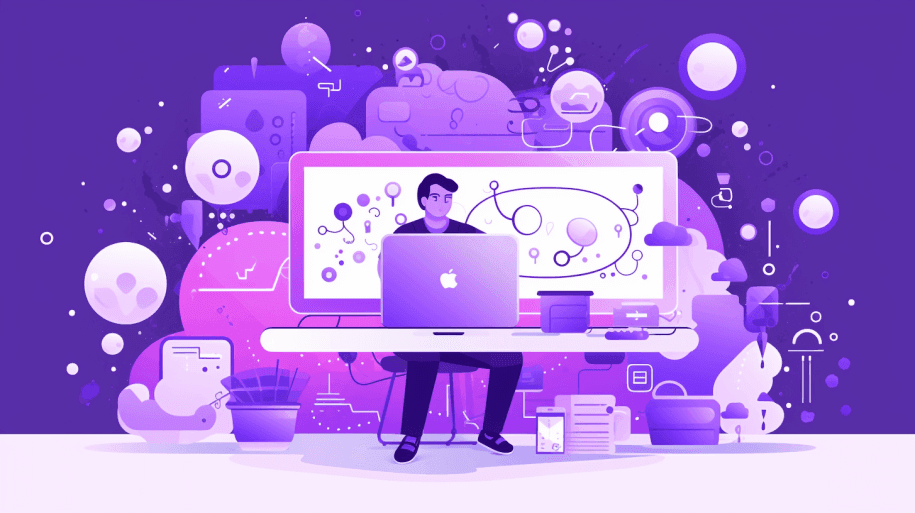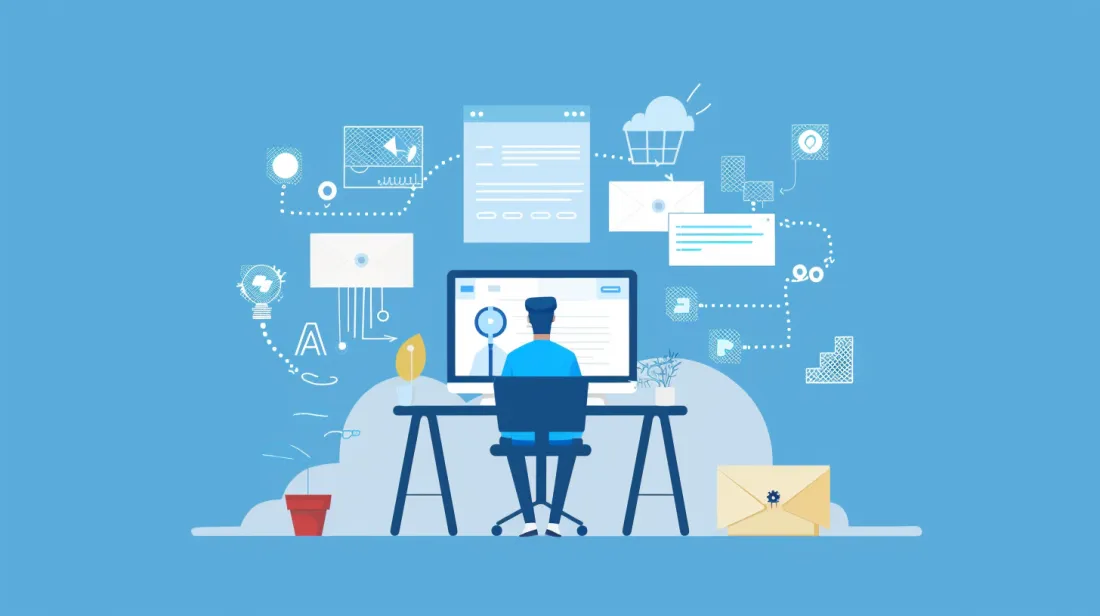8 Best Enterprise Headless CMS Platforms
- User Experience

In today's digital age, content management is at the heart of every successful business strategy. This is where enterprise headless CMS comes into play, enabling businesses to handle content in a structured and versatile manner.
Join Kapsys as we explore the world of enterprise headless CMS and present you with the eight best enterprise headless CMS platforms to consider for your business.
What Is an Enterprise Headless CMS?
An enterprise headless CMS is a content management system that separates the content creation and management process from the content delivery. In traditional CMS systems, content is tightly coupled with the presentation layer, making it challenging to adapt to the diverse range of digital platforms and devices in today's multi-channel world.
Enterprise headless CMS, on the other hand, provides content as data over APIs, allowing developers to integrate and display content on various front-end platforms, such as websites, mobile apps, IoT devices, and more.
This decoupling of content and presentation gives businesses greater flexibility and scalability, making it a go-to solution for enterprises looking to streamline content management.
Now, let's look at the eight best enterprise headless CMS platforms!
Read: Ultimate Guide To Choosing Your Headless CMS
1. Strapi
Strapi has gained immense popularity as an open-source, self-hosted, enterprise headless CMS. It offers a flexible and extensible content management system with a user-friendly interface. Strapi is perfect for developers, providing them the tools to create, manage, and deliver content effectively.
Key features:
User authentication and permissions
Custom content types
Asset management
Plugin system for extensibility
Drawbacks:
Requires technical expertise for setup and maintenance.
It might require a steep learning curve for those new to enterprise headless CMS and web development, potentially slowing down content management.
can be resource-intensive, demanding significant server capacity and infrastructure, leading to higher operational costs.
Strapi is known for its vibrant community and an array of available plugins and integrations, making it a versatile choice for enterprises seeking flexibility and control over their content management.
Read: What Is Strapi, And Why Is It A Leading Headless CMS?
2. Kontent.ai
Kontent.ai, powered by Kentico, is a cloud-based enterprise headless CMS designed explicitly for enterprise content management. It offers a content-first approach, enabling content creators to work collaboratively while providing developers with easy integration options.
Key features:
Content modeling and versioning
Multilingual support
Omnichannel content delivery
Content collaboration and workflows
Analytics and personalization
Drawbacks:
Pricing can be on the higher side for small businesses.
Complexity may be overwhelming for smaller businesses with limited technical expertise, potentially leading to difficulties in onboarding and content management.
Kontent.ai is a feature-rich, scalable enterprise headless CMS platform that can adapt to various enterprise needs and content distribution channels.
Read: Benefits Of Using Kontent.ai As A Content Management Solution
3. Contentful
Contentful is a famous enterprise headless CMS known for its simplicity and versatility. It's a developer-friendly platform allowing content delivery across multiple channels, making it ideal for enterprises with diverse digital content needs.
Key features:
Real-time content updates
Asset management
GraphQL API
Content localization
Integration with other tools and services
Drawbacks:
It can get expensive as usage scales up.
It might have limitations regarding advanced customization, which can be a drawback for enterprises with unique content presentation needs.
Contentful's robust API and extensive marketplace of pre-built apps and integrations offer the flexibility and customizability that enterprises require.

4. WordPress VIP
While WordPress is primarily associated with traditional content management, WordPress VIP is an enterprise headless CMS. It offers the reliability and scalability required for high-traffic websites and demanding digital experiences.
Key features:
Secure cloud hosting
Enterprise-grade support
Multisite capabilities
Custom development options
Content publishing and workflow management
Drawbacks:
It can be overly complex for smaller websites. It might entail unnecessary features and intricacies that smaller enterprises don't require, making it a resource-heavy choice.
WordPress VIP is an attractive enterprise headless CMS option for businesses that value the familiarity of WordPress and need a robust, managed hosting solution.
5. dot CMS
dot CMS is a Java-based enterprise headless CMS designed for enterprise-level content management. It offers a suite of features, from content creation and editing to content delivery and analytics.
Drawbacks:
Content modeling and versioning
Workflow and approval processes
Personalization and targeting
Multi-site management
Integration with e-commerce platforms
Drawbacks:
It may require Java expertise.
It can involve complex customization processes, potentially causing delays and added costs for businesses with intricate requirements.
dot CMS provides a comprehensive solution for enterprises seeking a secure and highly customizable enterprise headless CMS platform.
6. Butter CMS
Butter CMS is an enterprise headless CMS platform that aims to simplify content management for developers and marketers alike. It provides a well-documented API and an intuitive user interface for content creation.
Key features:
Real-time content updates
Localization and multi-site support
SEO-friendly content editing
Integration with popular front-end frameworks
Instant content deployment
Drawbacks:
Limited to more straightforward use cases.
Butter CMS is a straightforward, user-friendly solution suitable for businesses looking for an enterprise headless CMS with easy adoption and minimal learning curve.
7. Builder.io
Builder.io is a unique enterprise headless CMS platform that offers a visual approach to content management. It allows technical and non-technical users to create and manage content through a drag-and-drop interface.
Key features:
Visual content editing
Collaboration tools
Real-time previews
A/B testing and personalization
Custom data integrations
Drawbacks:
Some advanced features may require technical expertise, potentially limiting the scope of customization for non-technical users.
Builder.io is a modern solution for enterprises seeking a content management system that bridges the gap between marketers and developers.
8. Ghost CMS
Ghost CMS distinguishes itself as an enterprise headless CMS system, focusing on serving bloggers and online publications. It's celebrated for its uncluttered and user-centric approach to content creation.
Key features:
Simplicity with a focus on content creation.
Fast and lightweight.
SEO-friendly.
Suitable for bloggers and publications.
Drawbacks:
Limited in terms of complex content modeling.
It may require custom development for advanced features.
This enterprise headless CMS might not be suitable for everyone, but it's known to be one of the most convenient, hence its popularity.

How to Choose the Right Enterprise Headless CMS for You?
Selecting the right enterprise headless CMS is a pivotal decision for your enterprise's digital journey. It's like choosing the perfect tool for a specific job. To make this decision a breeze, let's break down the steps to find the ideal CMS for your business.
Identify your needs
To begin, understand what your business requires. Is it complex content structuring, collaboration features, or language-specific support? It's crucial to identify your needs clearly before moving forward.
Scalability
Think about the future. Can the enterprise headless CMS adapt to your growing content management demands? Ensuring scalability is critical.
Ease of use
The enterprise headless CMS should be user-friendly. Your team should be able to navigate it without extensive training.
Customization
Consider the level of customization you need. Some enterprise headless CMS platforms offer high flexibility, while others have limitations. Ensure it aligns with your project's requirements.
Read: How To Customize Strapi CMS: Adding Plugins And Modifying Configurations
Cost
Calculate the costs. Different enterprise headless CMS platforms have various pricing structures. Choose one that suits your budget.
Community and support
Look for a supportive ecosystem. A strong community or reliable support team can make a significant difference in addressing issues and making the most of your chosen CMS.
Performance and security
Ensure that the enterprise headless CMS meets your performance and security standards. This is crucial for content integrity and user data protection.
Read: CMS Authentication and Permissions: Setting Up User Roles And Security Measures In Strapi
Integration capabilities
Think about how well the CMS integrates with other tools your enterprise uses, like CRM, e-commerce platforms, and analytics tools.
Read: How To Integrate Kontent.ai with E-commerce Platforms?
A robust enterprise headless CMS is the bedrock of a thriving digital strategy in today's fast-paced business environment. Following these steps, you can confidently select the perfect CMS for your enterprise, ensuring a successful digital journey.

Conclusion
Enterprise headless CMS is vital for businesses aiming to stay competitive and responsive in today's digital landscape. Considering the options presented here, you can make an informed decision and choose the best headless CMS for your enterprise's unique needs.
Remember that the right choice can significantly impact your business's ability to adapt to changing market demands and reach your target audience effectively. Explore these top enterprise CMS platforms and assess how they align with your content management requirements.
Stay tuned with Kapsys to learn all about enterprise headless CMS and more!


